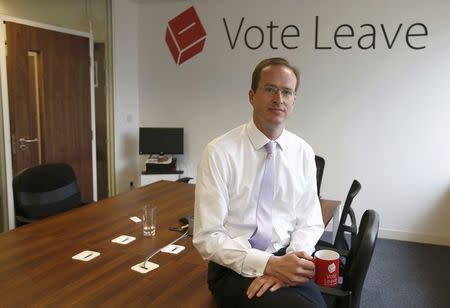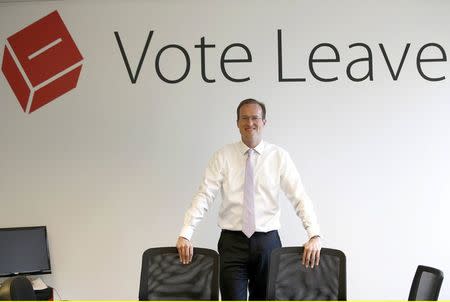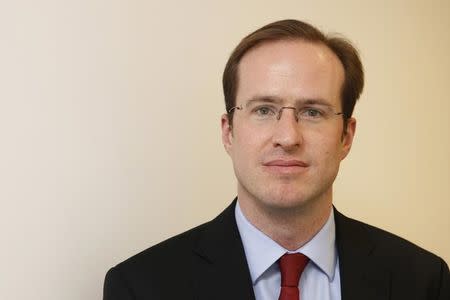Campaigner confident anti-elite winds will deliver Brexit
By Guy Faulconbridge and Kate Holton LONDON (Reuters) - Anger at established elites and irritation at the interventions of leaders such as U.S. President Barack Obama will help to push British voters to opt for an exit from the European Union on June 23, the head of the Vote Leave campaign said. With a team of about 60 full-time staff in a tower block across the River Thames from Parliament, Matthew Elliott is plotting what he describes as a revolution: Brexit. A British exit would rock the European Union -- already shaken by differences over migration and the future of the euro zone -- by ripping away its second-largest economy, one of its top two military powers and by far its richest financial center. While Boris Johnson, the most popular politician on the Out side, grabs headlines, Elliott and his campaign director, Dominic Cummings, 44, are the strategists behind a campaign to pull Britain out of a club it joined in 1973. For Elliott, 38, the EU referendum is a David and Goliath battle with elites and a doomed European project that endangers Britain's prosperity. Elliott told Reuters in an interview that his campaign has gained traction from anti-establishment winds that have grown in Western Europe since the 2008 economic crisis and resentment over warnings about Brexit from big companies and world leaders. "We are capturing that wind and I think it could be the thing which really drives us to victory," Elliott said in the countdown to the referendum next month. "I wouldn't see it as the wind of [presumptive Republican presidential nominee Donald] Trump - I think there is a much wider anti-establishment feeling across the world," he said. From Obama and Japanese Prime Minister Shinzo Abe to the International Monetary Fund and Wall Street, world leaders and institutions have lined up behind Prime Minister David Cameron to caution voters about the risks of dropping out of the EU. Pro-Europeans say a Brexit vote would unleash market turmoil, torpedo British clout, undermine London's status as a top financial capital, weaken Western security and even delay the Federal Reserve's next interest rate rise. OBAMA OR CRICKET? Opponents of the EU say such warnings are overblown and that though there could be short-term market volatility, Britain would prosper if it broke the shackles which have linked it to a decaying German-dominated experiment in European integration. The Brexiteers admit they are outgunned. Cameron's backing for EU membership has the support of some of the world's most powerful companies such as Microsoft and GE, banks such as Goldman Sachs and JPMorgan, world leaders such as Obama and even traditional domestic foes such as the Labour Party, trade unions and Scottish nationalists. "Yes, taking that on is tough but it doesn't represent where the vast majority of the British public are," said Elliott. Elliott said Obama's warning that Britain would be at "the back of the queue" for a U.S. trade deal had backfired. Opinion polling in the immediate aftermath of the Obama visit showed no sudden increase in support for the In campaign. "Obama could have had a huge impact had it been done in a softer and more subtle way but the way in which it came out, basically saying: 'Get to the back of the queue if you leave the EU' - that resonated extremely badly with people," he said. Just days before Obama's intervention, Ian Botham, one of England's greatest cricketing all-rounders, publicly backed a British exit. "If you ask the average person who do you trust more with the UK's best interests: Obama or Botham? Most people would say: 'Well actually I am more interested in what Ian Botham says than what Obama says'." Canadian Prime Minister Justin Trudeau said he did not want Britain to leave the EU and that there would be nothing easy or automatic about negotiating a new trade deal. "When we vote to leave we can take back control of the ability to strike trade deals that we've given up to Brussels bureaucrats," Elliott said, when asked to comment on Trudeau's comments. "Canada hasn’t given up control of its borders or handed Brussels 350 million pounds every week to trade with the EU, and nor should we." "BIG GUNS" Vote Leave's strategy is to underscore the danger of staying in an EU which even many pro-Europeans agree has failed to solve a series of crises. A senior source in Vote Leave said: "I had expected that by now that we would have been crushed like bugs and that it would be over but it is not." "Remarkably we have a fighting chance of winning and we have not fired our big guns yet," said the source. Most recent opinion polls have shown the In campaign ahead. When asked about a recent poll showing the In campaign 18 percentage points ahead, Elliott said the two campaigns were basically neck-and-neck. "The private polling is good. We're still confident based on all the polling we're getting," he said. A libertarian who came to prominence as a campaigner since founding the TaxPayers’ Alliance pressure group in 2004, Elliott admits he is thrilled to be at the center of what he says is the world's most important vote this year. He successfully directed the campaign against a change to the electoral system in a 2011 referendum when 68 percent voted against picking the "alternative vote" method of election. While the Out campaign may be outgunned internationally, Elliott questioned whether the In campaign had moved too early to deploy its most influential speakers. And Out has advantages in Britain. Out campaigners attracted more funding than the In campaign in the latest 12-week reporting period for which figures are available, many eurosceptic newspapers oppose membership and it has a strong and passionate grassroots organization. Overall Out campaigners outnumber In campaigners on the ground by 10 to 1, Elliott said. He did not give full figures. Turnout may decide much. "If turnout is less than 60 percent then Leave is in a much better position because our voters are much more enthusiastic than the Remain voters are," he said. So will Out really win? A long pause and then: "I am increasingly confident that we are going to win. Is the champagne ready? "There is no champagne ready. We are very abstinent here: we are focused on the campaign." (Editing by Peter Millership)




